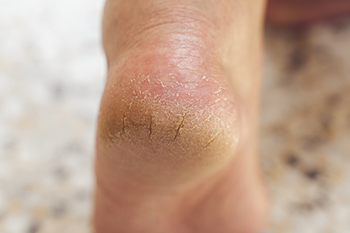
Cracked heels, or heel fissures, occur when the skin surrounding the heels becomes dry, thickened, and inflamed. One common cause of cracked heels is diabetes, where poor circulation and nerve damage lead to dry skin and a higher risk of infections. Diabetic heel fissures are often more severe due to decreased sensitivity in the feet, which can prevent individuals from noticing wounds early. Other causes include prolonged standing, wearing ill-fitting shoes, or having flat feet, which increase pressure on the heels. Symptoms of cracked heels include pain, redness, swelling, and visible cracks or splits in the skin, sometimes accompanied by bleeding or infection. If you have diabetes and have developed cracked heels, it is suggested that you are under the care of a podiatrist who can offer effective relief and treatment therapies.
Cracked heels are unsightly and can cause further damage to your shoes and feet. If you have any concerns, contact Dr. Nicholas Przystawski from Central Florida Foot Care, PA. Our doctor can provide the care you need to keep you pain-free and on your feet.
Cracked Heels
Cracked heels appear unappealing and can make it harder for you walk around in sandals. Aside from looking unpleasant, cracked heels can also tear stockings, socks, and wear out your shoes. There are several methods to help restore a cracked heel and prevent further damage.
How Do You Get Them?
Dry skin is the number one culprit in creating cracked heels. Many athletes, walkers, joggers, and even swimmers suffer from cracked heels. Age and skin oil production play a role to getting cracked heels as well.
Promote Healing
Over the counter medicines can help, especially for those that need instant relief or who suffer from chronic dry feet.
Wear Socks – Wearing socks with medicated creams helps lock in moisture.
Moisturizers – Applying both day and night will help alleviate dryness which causes cracking.
Pumice Stones – These exfoliate and remove dead skin, which allows for smoother moisturizer application and better absorption into the skin.
Change in Diet
Eating healthy with a well-balanced diet will give the skin a fresh and radiant look. Your body responds to the kinds of food you ingest. Omega-3 fatty acids and zinc supplements can also revitalize skin tissue.
Most importantly, seek professional help if unsure how to proceed in treating cracked heels. A podiatrist will help you with any questions or information needed.
If you have any questions, please feel free to contact our office located in Leesburg, FL . We offer the newest diagnostic and treatment technologies for all your foot care needs.
